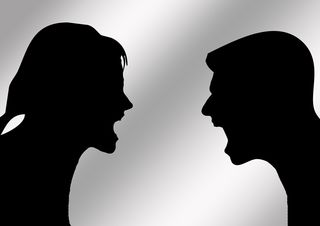Empathy
Do We Need a Common Enemy?
Enemies can fill important needs in our lives.
Posted December 17, 2018 Reviewed by Ekua Hagan

Political polarization in the US is higher than ever. People are more divided on the issues than ever before, and Democrats and Republicans are increasingly refusing to engage with their political opponents or their ideas.
However, it’s unclear if political polarization is a problem that we actually want to solve. Our political opponents may be filling important needs in our lives, giving us scapegoats to blame, common enemies to unite over, and a simplified cause behind complex problems.
A recent study found that enemies can give us comfort in the face of uncertainty. Social psychologists Daniel Sullivan and colleagues found that when they presented participants with a passage describing the US government and economic structure as chaotic and disorderly, people were more willing to attribute greater influence to an enemy in their life. In a follow-up study, the researchers found that presenting people with information about a powerful enemy like Al-Quada boosted people’s perceptions of perceived control.
Instead of believing that bad things happen for no reason, enemies give us a sense of control, allowing us to attribute bad things to a clear cause that can be understood, contained, and controlled.
Common enemies can also serve to unite people. After 9/11, many Americans reported feeling a heightened sense of unity and patriotism. They felt as if they could ignore divisions across party lines and unite against a common enemy. And common enemies make friendships grow stronger. One study found that people are more likely to bond over a shared dislike—rather than a shared fondness—of a third party. Denigrating an enemy can also boost our self-esteem by making us and the groups we identify with seem better in comparison.
Social psychologist Roy Baumeister has warned against succumbing to the myth of “pure evil,” or the belief that evil stems from sadistic enemies enacting cruelty against innocent villains. The reality of what we perceive as “evil” is often much more complicated than this. For example, actions that our own side views as evil can be perceived by the other side as being motivated by love and empathy. A study found that while both Democrats and Republicans think that their own side is motivated by love for their own party, they believe their political opponents are motivated by hatred for the other party.
But, the myth of pure evil may be serving important existential functions, staving off feelings of meaninglessness. In one study, psychologist Clay Routledge presented participants with a philosophical essay that described human life as meaningless and insignificant. Some participants who read this essay were more likely to attribute cruel acts to “magical evil” forces, believing that people are simply born evil or have dark souls.
In searching for ways to heal our political divide, we need to consider the potential functions this divide might be serving. It may give us a sense of comfort and meaning to be able to draw clear distinctions between friend and enemy, to know whom to blame, and to know what we are fighting for.
Intractable political divides aren’t just going to go away—especially during times of disorder when we find solace in simplifying our complex world and placing blame on an all-powerful enemy. Efforts to reduce political polarization should recognize that our divisions may be fulfilling important needs and that we need to find other ways to fill these needs if we truly want to reduce conflict.


